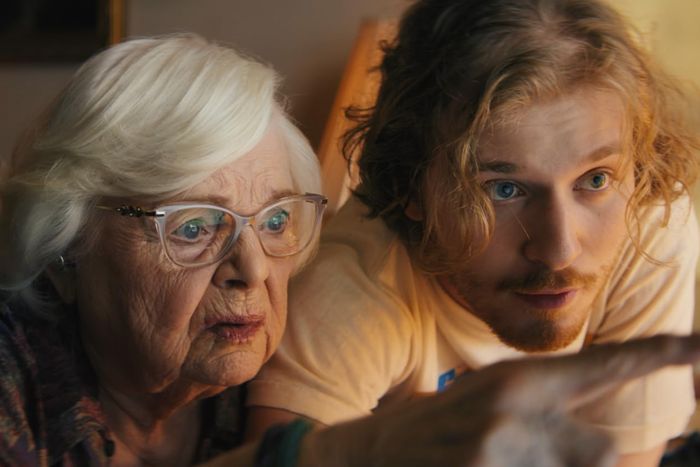
This review was originally published on January 22, 2024 out of the Sundance Film Festival. We are recirculating it now timed to Thelma’s theatrical debut.
“Hey everybody, I’m gonna haul ass to Lollapalooza!” Even now, 28 years later, those lines uttered by Grampa Abe Simpson as he revs up a motorcycle still constitute one of my favorite jokes on The Simpsons. It’s such a perfect skewering of the old-person-does-thing genre of humor that was so prevalent back then and is still fairly common now. But then something like writer-director Josh Margolin’s Thelma comes along, about a 94-year-old woman who goes on a quest to locate the crooks who scammed her out of $10,000, and manages to be so charming and heartfelt that the laughs never feel lazy, cheap, or cruel. Its observations about the disconnect between its elderly protagonist and the society around her are surprisingly relatable.
When we first meet Thelma Post (June Squibb), she’s struggling with her computer, as her beloved layabout grandson Daniel (Fred Hechinger) tries to help her. (“How do I … I need the … Where is the … What’s an ‘inbox’?”) Thelma has been living alone ever since her beloved husband, Ted, passed away, and Daniel, it seems, is the only family member who has any time for her; he’s also a little depressed in the wake of a bad breakup. So when Thelma receives an anxious phone call from a voice claiming to be her grandson, saying that he’s in jail after hitting a pregnant woman with a car and needs $10,000 in cash sent by mail to his defense attorney, she buys it. Before she sends the money, Thelma calls her daughter, Gail (Parker Posey), Daniel’s mom. Getting no answer, she then calls Alan (Clark Gregg), his father. Neither parent responds in time, so off Thelma goes to the post office with the money. The world doesn’t have time for her, but she has time for the world — that’s her weakness.
The 94-year-old Squibb, a marvelous actor who’s never really gotten a lead role like this, turns what is otherwise a pretty simple and cute set-up into something far more profound. That Thelma got scammed is further proof to Gail and Alan that it might be time for her to move into an old-age facility. Thus, Thelma’s quest to find the people that did this to her becomes about more than righting a wrong or getting her money back; it becomes a way of proving to everyone (and herself) she still has agency in her life. That doesn’t stop Margolin from riffing on spy movies and action flicks. One of Thelma’s inspirations is the spectacle of Tom Cruise sprinting across the rooftops of London in Mission: Impossible — Fallout. For her, he becomes a symbol of persistence and resilience in one’s advancing years.
Helping Thelma on her quest is Ben (Richard Roundtree), a friend who still grieves the loss of his wife, and who putters around on a fancy scooter that our heroine “borrows.” Casting the man who was Shaft as Ben makes fine use of his charisma, but it also gives Roundtree, in his final role, a lovely chance to show his range. The melancholy Ben’s desire to help Thelma comes from a need for purpose and companionship: He wants to feel useful, and he kind of likes her. But he also has his own demons he’s trying to overcome. When his wife died after a bad fall, he couldn’t hear her, and he blames himself for her loss.
Thelma generates clever, inoffensive fun from assorted elderly challenges. Ben and Thelma use their digital hearing aids like earpieces in a caper flick: He helps her navigate a cluttered antique store strewn with lamps and Hummel figurines as if it were an elaborate laser-beam security system. A breathless and hilarious action scene (or, well, “action” scene) involves one person in a speeding car guiding another on how to close a pop-up ad as if it were a bomb that needs to be defused.
All throughout, Margolin makes sure that these aren’t gags poking fun at old people for being out of touch: Often, Daniel and Thelma find themselves faced with similar challenges. At one point, she asks him what a computer is, pretending to be a clueless old person. Then, she smiles. “I know what a computer is,” she explains, “but what is it really? How does it function?” Daniel has no idea. The point is that Thelma might be confused, but deep down, so are we all. As the world spins ever forward, we all wind up out of touch with it soon enough.
More Movie Reviews
- Fernanda Torres Is a Subtle Marvel in I’m Still Here
- Grand Theft Hamlet Is a Delightful Putting-on-a-Show Documentary
- Presence Is the Best Thing Steven Soderbergh’s Done in Ages


